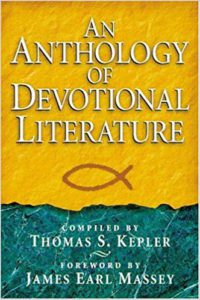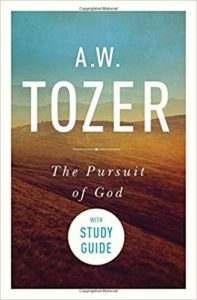 |
 |
Protestant devotional literature was once well-served by popular writers like E. Stanley Jones, Eugene Peterson, Philip Yancey, Gordon MacDonald & J Oswald Sanders but today they are fading from the scene. The writers who are taking their place are eclectic in their approach to “spirituality.” Some are inspired by writers like Thomas Merton, Henri Nouwen and Jean Vanier who wrote from the tradition of Roman Catholic spiritual theology while others betray traces of New Age spirituality. Not surprisingly, the word “spirituality” has also proven to be an amorphous catch-all word. Nowadays, a lot of what goes as Christian spirituality is actually some form of syncretism mixed with disturbing and unorthodox theology (e.g. Richard Rohr). But to be fair we need to judge modern spirituality writers on a case by case basis. For example, the rediscovery of “spiritual disciplines” (c.f. Roger Forster & Dallas Willard) has been helpful to Protestants looking for “handles” as well as a map of spiritual progress in their devotional exercises & spiritual formation.
Obviously, these modern spiritual writings are different from the classical Protestant spiritual tradition that is represented by Puritan divines like John Bunyan, John Owen and William Gurnall (you may sample the abridged editions of these writers published by Banner of Truth), and more recent preachers like J.C. Ryle, Charles Spurgeon and Andrew Murray. The Puritan writers emphasized that true spirituality must be scriptural, holistic and experiential. John Flavel wrote, “The Scriptures teach us the best way of living, the noblest way of suffering, and the most comfortable way of dying.” The Puritans wove together biblical exposition, doctrinal theology and spiritual exhortation into a seamless whole. As J.I. Packer notes that Puritan spirituality combines “clear-headed passion and warm-hearted compassion.”
Thankfully, there are also excellent spiritual writings found beyond the Reformed tradition. For example, you should consider reading Oswald Chambers, an early Holiness-Pentecostal writer, who displays evident spiritual depth and authenticity. The hefty volume, The Complete Works of Oswald Chambers (Discovery House Pub., 2000) comprises 1500 double-column pages, provides a feast of Scripture inspired meditation that is unconcern about meditation methods & techniques.
To be sure, one may criticize these classical Protestant spiritual writers on grounds that they offer a “privatized and individualistic faith.” But this is surely quibbling. These writers wrote to inspire Christians to strive at spiritual depth & authenticity. These critics can welcome to read elsewhere to satisfy their interest in social activism.
Finally, the writings of A.W. Tozer continue to be perennially inspiring. His writing is unpretentious and set in simple layman’s language without any display of learning that is accompanied by academic footnotes. But his writings offer surpassing spiritual insights because he has drunk deeply from the fountain of classical spiritual writers. His spiritual authenticity is surely the fruit of a life of ardent prayers. Tozer is considered by many to be a genuine prophet as he never ceased to warn the Church against compromising its holy calling in order to gain approval by the world. He wrote, “Religion today is not transforming the people – it is being transformed by the people. It is not raising the moral level of society – it is descending to society’s own level and congratulating itself that it has scored a victory because society is smiling accepting its surrender.”
Call me dated and old fashion, but to me “Old Wine” spirituality remains the best.
—————————-
Recommended Devotional or Spirituality Literature
A. W. Tozer recommended these books for those who would know “the deep things of God.” In making his recommendations, Dr. Tozer did not unconditionally approve the entire contents of these writings. Rather he offered the list as products of men and women who ardently loved their Lord. Any doctrinal defects in the books would be far outbalanced by their spiritual verities.
The Adornment of the Spiritual Marriage, Jan van Ruysbroeck
The Ascent of Mt. Carmel, Saint John of the Cross
The Ascent of Mt. Zion, Bernardino de Laredo
Centuries of Meditations, Thomas Traherne
Christian Perfection, François Fénelon
The Cloud of Unknowing, Anonymous
Confessions, Saint Augustine
The Dark Night of the Soul, Saint John of the Cross
The Fire of Love and the Mending of Life, Richard Rolle
The Goad of Love, Walter Hilton
A Guide to True Peace, Miguel de Molinos and others
Hymns, Gerhard Tersteegen
The Imitation of Christ, Thomas à Kempis
Introduction to the Devout Life, Francis De Sales
Letters of Direction, Abbé de Tourville
The Little Book of Eternal Wisdom, Henry Suso
On the Incarnation, Athanasius
On Loving God, Saint Bernard of Clairvaux
Hymns Selected from Frederick William Faber, D.D., Frederick W. Faber
The Poetical Works of Isaac Watts, Isaac Watts
The Practice of the Presence of God, Brother Lawrence
Private Devotions, Lancelot Andrewes
Proslogion, Anselm of Canterbury
The Quiet Way, Gerhard Tersteegen
Sixteen Revelations of Divine Love, Juliana of Norwich
The Scale of Perfection, Walter Hilton
Sermons, Johannes Tauler
Song of Songs, Saint Bernard of Clairvaux
The Spiritual Combat, Lorenzo Scupoli
Spiritual Guide, Miguel de Molinos
Talks of Instruction, Meister Eckhart
A Testament of Devotion, Thomas R. Kelly
Theologia Germanica (Winkworth Translation), Anonymous
The Vision of God, Nicholas of Cusa
The Way to Christ, Jacob Boehme
[Source: James Snyder, The Life of A.W. Tozer in Pursuit of God (Bethany House, 2009)]
May I also recommend a convenient anthology of classical devotional (spiritual) writings? An Anthology of Devotional Literature 2e. Edited by James Earl Massey & Thomas Kepler Evangel Publishing House, 2001.
I am currently reading a couple of books, one by Thomas Boston – the master of the metaphor and another that is not properly speaking, a devotional book, but actually winds up having a strong devotional quality to it. This is the book, He Who Gives Life, by Graham Cole.
That said, I think it is worth noting that there are books out there today that are not properly speaking devotional books, however they are so strong in their devotional quality, that they may as well be regarded as de facto devotional books. Randy Alcorn’s Happiness comes to mind.
Also Biblical Theology books (aka ~ thematic theology) of which many are not found in yester-century, can also work well as devotional books. For my devotion this morning, I looked at the theme of “perfection” across the two Testaments an in various Bibles. Had I a Biblical Theology book, that would have complemented my devotion quite well
Thanks,
~ R. Rao
P.S. Pensée du matin –
“This God—His way is perfect; the word of the Lord proves true; He is a shield for all those who take refuge in Him.”
~ Psalm 18:20
(As incredible as it sounds, in this fallen, broken and wretched world, all His ways are perfect – not just good or great, but perfect. God’s ways are the one stream of perfection that runs through this dry and weary land. Amen!)